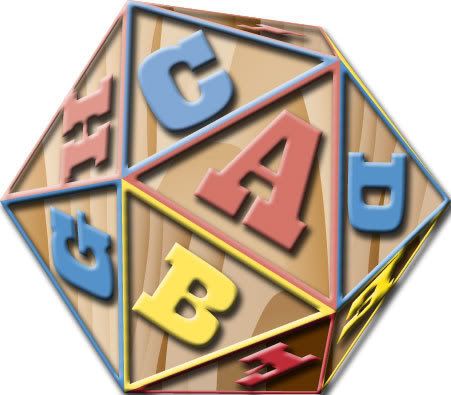A threshold has been crossed! Seven-year olds are still full of life but have a much greater skill set (physical and mental). Sometime around this age, kids reach what some child development literature calls the “Age of Reason.” It has been my experience that at sometime around this age, children really begin to bloom into what can honestly be called a “gamer”; sometimes it happens sooner, sometimes later. While roll-and-move games still abound, there begins to be an obvious branching out. They are starting to look for more in their games. It’s enough to warm the cockles of a gamer’s heart (what exactly are those anyway?). So, in a very general sort of way, here is a summary of seven-year olds (remember that each individual develops at a different pace in different areas – this list isn’t meant to compare one kid to another):
Has better muscular control. Is developing interest and skills in certain games, hobbies, and activities. Gets restless and fidgety. Has nervous habits, and sometimes assumes awkward positions. Is full of energy, but tires easily. Is eager to learn. Thinks seriously and more logically. Is able to solve problems that are more complex. Likes to be challenged, work hard, and take time completing a task. Has a good attention span. Enjoys hobbies and using skills. Likes to collect things and talk about personal projects and accomplishments. Often plays in groups, but sometimes likes to be alone and play quietly. Interacts little with the opposite sex. Is eager to be like peers and have their approval. Is less domineering and less determined to have his or her own way. Likes more responsibility and independence. Is often worried about not doing well. Dislikes criticism. Is more sensitive to his or her own feelings and those of other people. Is often a perfectionist, and tends to be self-critical. Is inhibited and cautious. Is less impulsive and self-centered than at earlier stages.
Suggestions:
Use action games that allow the child to use his or her energy. Just sitting still at a table or on the floor isn’t going to work. Trust me. Be patient (notice that I’ve mentioned this in every post so far?) with annoyances and restlessness. In role-playing games, ask thought-provoking questions instead of just telling a story yourself. Allow the child to make major decisions. Give him or her plenty to time to think and accomplish tasks. This goes for any game. If you rush it, frustration can set in easily and the enjoyment (for both child and adult) quickly goes downhill. On the other hand, help them get over any “move-paralysis” with kindness in mind – meaning, don’t lean in real close and shout at the top of your lungs, “IT DOESN’T MATTER! JUST MOVE SOMETHING ALREADY!” Doing this will end up just as badly as it does with adults. Encourage the child to pursue hobbies and interests. There are going to be some things that just don’t grab the child’s attention. As difficult as it may be to cope with, one of those things might be certain types of games. Find what he or she likes THEN find a game to supplement it. Don’t underestimate the power of theme. Give the child responsibilities and tasks that he or she can carry out (such as being the banker or drawing the map or whatever other little tasks there might be), and then praise efforts and accomplishments. Don’t overlook this – it might be a little thing for you, but it is a very “grown-up” thing for them. Give them a chance to use those skills they are learning (or should be learning) in school. Again, patience pays off.
Isaiah is seven. He is about as boy-like as you can imagine. He loves to be physical; swinging “sword” sticks, wrestling, running, and generally any sport or activity that allows him to show off his physical strength. On the mental side, he is starting to be very analytical; figuring out puzzles in the Legend of Zelda games, doing puzzles, drawing, and hugely into make-believe as evidenced by his using the figures from the Star Wars: Epic Duals game to battle it out on the 3D board from his sisters’ copy of Mall Madness (sigh, yes, we do own that game). One of the most surprising moments with him was when I was running all my kids through a hack-n-slash D&D game (no real plot, just take out the monsters). Completely out of the blue he pipes up with: “Why do we have to fight all the time? Can’t we talk to them?” And this is from the kid who always picks the mini with the biggest sword. I tried to hide wiping the tear from my eye as the thought went through my head that my little boy is growing up.
He is very capable of playing a lot of the more “grown-up” games, such as Settlers of Catan, Modern Art (although strategy completely eludes him at this point), Carcassonne, and others. They are not favorites, but he always asks to play one of the several games that have long been denied to him (due to my desire to keep all the pieces in one box). He loves to experiment and try new games…but the theme of the game drives most of his decisions.
Some of Isaiah’s favorite games (see if you can detect a theme here) are: Star Wars: Epic Duals, Star Wars: The Queen’s Gambit, Star Wars: Starship miniatures, Legend of Zelda for the Nintendo, Heroscape, Hero Quest, Dungeons and Dragons (the old basic set, not any of the newer versions), Pokemon (doesn’t really care for playing the game, he just likes looking at the cards) and I’m sure if we ever got a game that had anything to do with Avatar: The Last Airbender, it would shoot to the top of the list.
